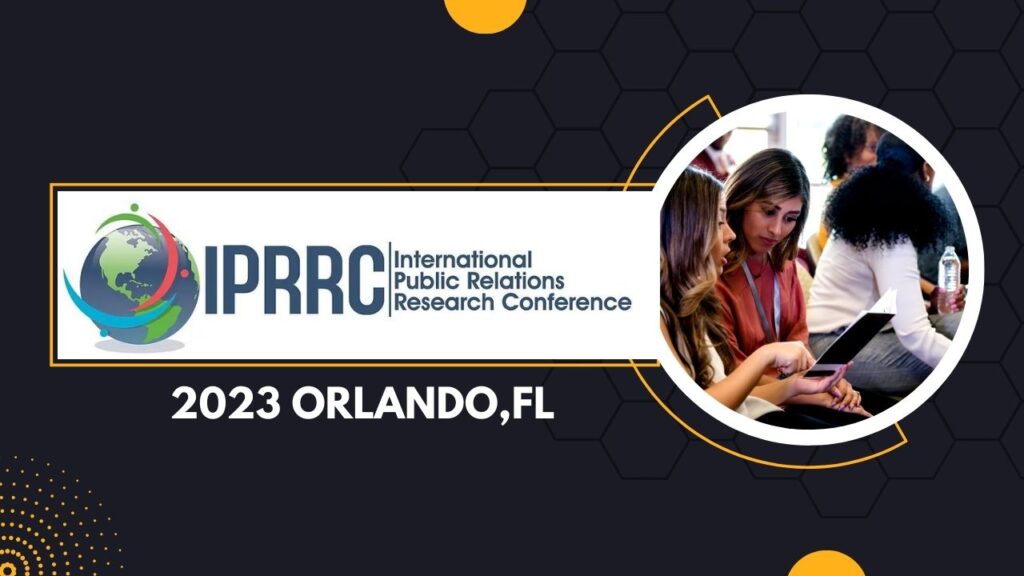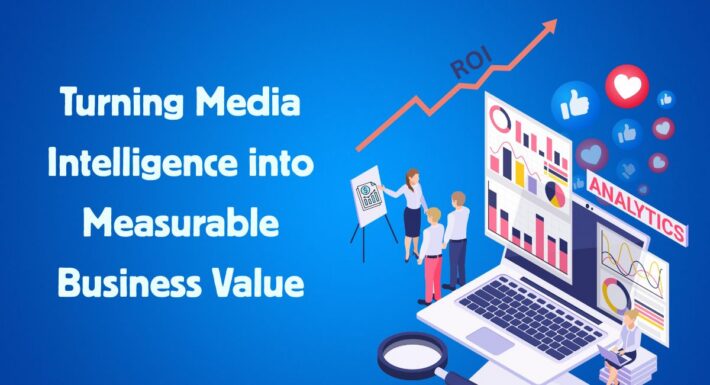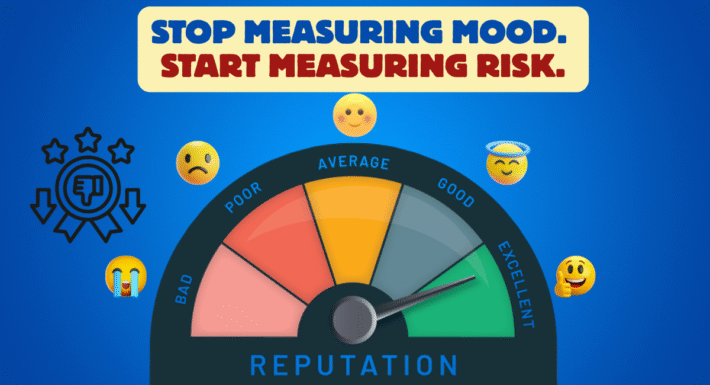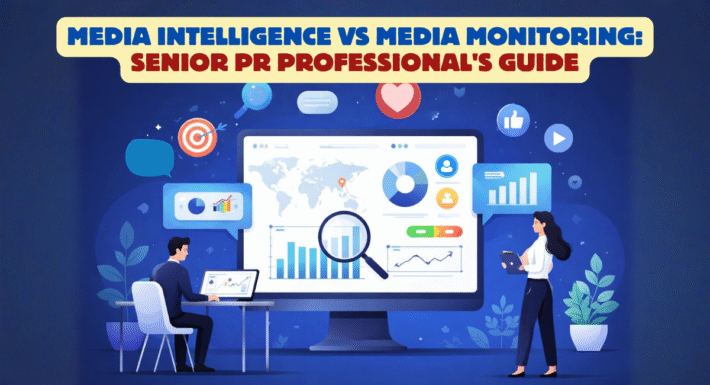This Year’s IPRRC Takes a Deep Dive Into the Year’s Most Insightful PR Research

Question: If research is performed alone and in a vacuum, does anyone care?
Answer: Probably not (other than the researcher).
That’s why the 26th annual International Public Relations Research Conference (IPRRC) is set to run from March 2 to 4 in Orlando: To showcase and connect bleeding-edge communications research with boots-on-the-ground PR practice.
This year’s event, one of the top conferences on 2023’s calendar, focuses on complex yet timely topics such as fake news, corporate advocacy, and quiet quitting. IPRRC examines PR research from several perspectives – from purely theoretical and experimental, to real-world case studies and participant observations.
“At IPRRC, academics and professionals discuss, debate, and explore, together, the research that forms the foundation of our practice,” explains Sean David Williams, IPRRC CEO-Elect, who adds that the event typically includes around 100 presenters in any given year. “It’s an intellectual banquet that simply cannot be replicated anywhere else.”
Some of the tasty dishes on offer at this year’s conference include:
- Long-Term Effects of Cancel Culture on Brand Perception: An Analysis of Gen Z
- Perceptions of Brands and Controversial Advertisements – University of Oklahoma
- Data-Washing or Data Driven: Deciphering the Role of Data in Public Relations Practice – Brigham Young University
- The Impact of the Global Pandemic on Pursuit of Professional Development Opportunities in Public Relations – Baylor University
- Internal Communication and Employee Activism: Perspectives from the Field – Boston University
- Beyond Advocacy: Vaccine Mandate Against Misinformation Era – University of Alabama
- A Matter of Trust: Understanding the Impact of Trust-Driving Attributes in Three Major American Companies in Media and Public Perceptions – Fullintel and University of Connecticut
While the topics and presentations at IPRRC are academic in nature, the organization keeps things as light and lively as possible through its unusual format of having presentations delivered entirely to small groups of attendees.
Speakers sit at a half-dozen tables and present to attendees for seven minutes. Attendees can then ask questions for eight minutes, and then the presenters and attendees switch tables and do it all over again. “That happens four times, so the audience discusses four of the six presentations per hour,” says Williams. “We then take a short break, and the next wave of presenters takes over.
The format ensures plenty of face time among attendees and presenters, the ability of attendees to ask detailed questions, and an intimate vibe you can’t get listening to a keynote in a packed 300-person lecture hall.
Sessions begin each day following opening welcomes at 8 a.m. Many discussions continue beyond the original 15-minute session, with lively conversations taking place throughout lunch or during refreshments.
A Critical Venue for Original PR Research
Such a venue to present original research to industry peers is crucial, says Fullintel Head of Insights Angela Dwyer, whose mixed-method analysis on trustworthiness will be presented by her research partner, the University of Connecticut’s Tyler Page, at this year’s conference.
“The final step in any research project I do is usually to try to present my research at IPRRC,” says Dwyer, who has presented at IPRRC multiple times. “It’s an excellent place to present your research, get feedback on it, and better refine it.”
Identifying the limitations in your study through the peer review provided by IPRRC is a great way to generate new ideas and fresh research, Dwyer says. “The research project isn’t a one-and-done thing. It’s ongoing. You often start with a study that leads to another study.”
Dwyer’s presentation this year will examine trust and benevolence among three major U.S. companies via content analysis and a nationally representative survey. The study shows that while trust has a significant effect on reputation, benevolence is a key factor around purchase intent, and that organizations should focus on building perceived trust and benevolence to boost both reputation and the bottom line.
New Insights and Impact Award Up For Grabs
The event concludes with an awards ceremony led by current and incoming IPRRC CEOs Don Stacks, the creator of IPRRC, and Sean David Williams, an assistant teaching professor of media and communication at Bowling Green State University.
While the organization is careful to state that not every award is given each year, IPRRC’s available awards include:
- Arthur W. Page Center Benchmarking Award ($1,000)
- Best Paper on the 26th IPRRC theme ($1,000)
- Boston University Award for the Top Paper about Public Relations and the Social and
- Emerging Media ($1,500)
- Baylor University Department of Journalism, Public Relations & New Media Top Ethics
- Paper Award ($1,000)
- International ABERJE Award ($1,000)
- Koichi Yamamura International Strategic Communication Award ($1,000)
- Fullintel Media Insights and Impact Award ($1,000)
This is the first year IPRRC will hand out the Fullintel Media Insights and Impact Award. It’s a $1,000 prize recognizing a research paper presented at the conference demonstrating the impact of actionable insights, with priority given to research supporting the use or development of value metrics or analysis that impact the profession.
Ultimately, the prize will go to the paper and researcher whose work best relates to metrics that matter and are most applicable across the entire industry.
Our very own VP of Product, James Rubec, will be at this year’s IPRRC, so feel free to chat with him when you see him! He’ll be pen in hand and will showcase some of the conference’s most compelling research in an upcoming blog post.
To register or view the conference program and hotel information, please visit IPRRC’s website.
Andrew Koeck is the Co-Founder and President of Fullintel, an award-winning media intelligence company that combines human expertise with AI to deliver curated media monitoring, measurement, and executive insights. With over 25 years of experience advising Fortune 1000 brands including Johnson & Johnson, Scotiabank, Bell Flight, and Royal Caribbean, Andrew specializes in transforming inefficient legacy systems into streamlined, data-driven solutions that empower communications and PR teams to act strategically in real time.
Before founding Fullintel, Andrew co-founded dna13, one of the first SaaS platforms for real-time media monitoring, later acquired by PR Newswire. Under his leadership, Fullintel has earned multiple PRSA Anvil and AMEC Awards for excellence in AI-powered media measurement and analysis. His expertise spans executive leadership, competitive intelligence, strategic partnerships, and product innovation—driving Fullintel’s mission to help organizations measure, manage, and maximize their reputation with precision.





